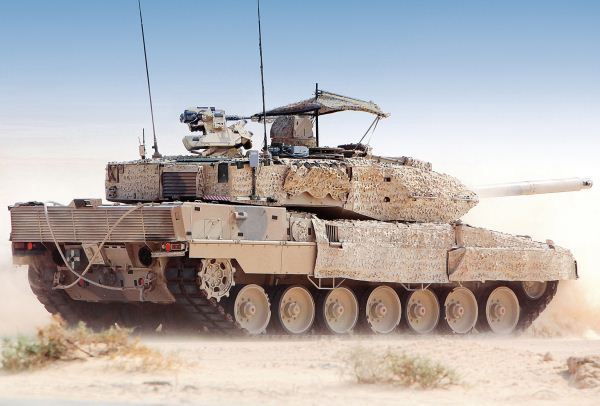German arms manufacturer Kraus-Maffei Wegmann (KMW) has just closed a billion dollar deal with Qatar that was five years in the making. On Thursday (18.04.2013), the Munich-based company announced that it signed a contract to deliver 62 Leopard 2 tanks and 24 self-propelled howitzers to the emirate. The price for the arms: roughly 1.9 billion euros ($2.48 billion).
Before the deal, Qatar owned old tanks and artillery from France and South Africa, according to KMW. Now the country wants to scrap the old weapons and modernize its 8,500-man army with the German manufacturer’s new weapon systems. As reported vaguely by news agencies, armament experts say Qatar wants to be prepared for a possible conflict with Iran. That sounds convincing to political scientist and Middle East expert Werner Ruf.
“One reason is definitely that Qatar is among the nations in the Gulf who consider Iran a real threat, and who want to arm themselves against that threat,” he told DW.
What is the armament for?
But one of the most important factors in such large weapons deals is money, Ruf said.
“Weapons are the goods that elicit the highest sums of bribery,” he said. “That makes for great earnings on the side for the person in charge of choosing the weapons.”
Qatar expert and political scientist Hamadi El-Aouni from the University of Berlin said he thinks the Gulf state wants the tanks to support friendly groups in other countries.
“It’s not impossible that that these weapons will be shipped off somewhere,” he told DW. “I assume toward Syria, via Turkey. Or possibly Lebanon.”
El-Aouni said he not believe Qatar is purchasing the weapons to protect itself from Iran. Home to a large US Air Force base, he said the United States would protect Qatar if it came to a confrontation with Iran.
Limited rights
The opposition parties in Germany heavily criticize the arms deal with Qatar. They point to the country’s autocratic government and lack of respect for human rights. Ruf and El-Aouni agreed with this assessment. The Arab news channel Al Jazeera in Qatar once stood for independent reporting and free access to news, but today its broadcasts are mostly filled with foreign propaganda, Ruf added.
There is also no opposition allowed in Qatar, El-Aouni said: “With very few exceptions, there is no freedom of expression. The emir and his family, as well as Qatar’s government, remain off-limits.” Qatar might not be a visible police state, but there are always secret observers watching you, El-Aouni added.
The fact that Qatar supported the rebels during many of the Arab Spring conflicts doesn’t mean that the country whole-heartedly supports democracy. They saw their own interests at stake, according to El-Aouni.
“Qatar hasn’t support the young people’s revolution so that democracies could rise in countries like Tunisia, Libya and Egypt. Qatar just assumed that the revolution would eventually lead to Islamist states and an Islamist community,” he said, adding that the country only held up a smoke screen of democracy.
That pseudo-democracy became visible in Qatar’s approach to foreign policy, Ruf said.
“The way they reacted to the uprising in Bahrain definitely gave them away,” he said. “While Al Jazeera praised the Arab Spring movement, the government sent tanks to Bahrain to support Saudi Arabia’s course of action: smothering the Bahrain uprising in blood.”
The West looks the other way
Ruf said political and strategic reasons were behind the West’s decision not to criticize the situation in Qatar more openly.
“I believe that there’s a trend toward a new international order behind all this,” he said. “The US can’t do everything they want anymore. They are moving their military power to the Pacific and are putting together a new security power in the Gulf region.”
Saudi Arabia and Qatar, members of the Gulf Cooperation Council, are the new powers, according to Ruf.These countries in turn work to secure their power by trying to make Arab nations, specifically those of the Arab Spring, more Islamist.
“You can see this in Egypt, and also in Tunisia, where huge amounts of money are spent to help the Islamists, and where this money is used to recruit thousands of fighters for the conflicts in Syria and Mali,” Ruf said, adding that human rights and democracy don’t have roles to play.
He added that Germany’s behavior is hypocritical, too: when Islamists march into Mali, everyone condemns it. “But at the root of all that, where human rights are abused systematically, every day, such as in Qatar and Saudi Arabia above all, the West just looks the other way.”
Ruf quoted German Foreign Minister Guido Westerwelle as proof for legitimization of authoritarian Gulf states. He said Westerwelle said that Saudi Arabia was an anchor of stability and that Qatar helped hold that anchor down.










